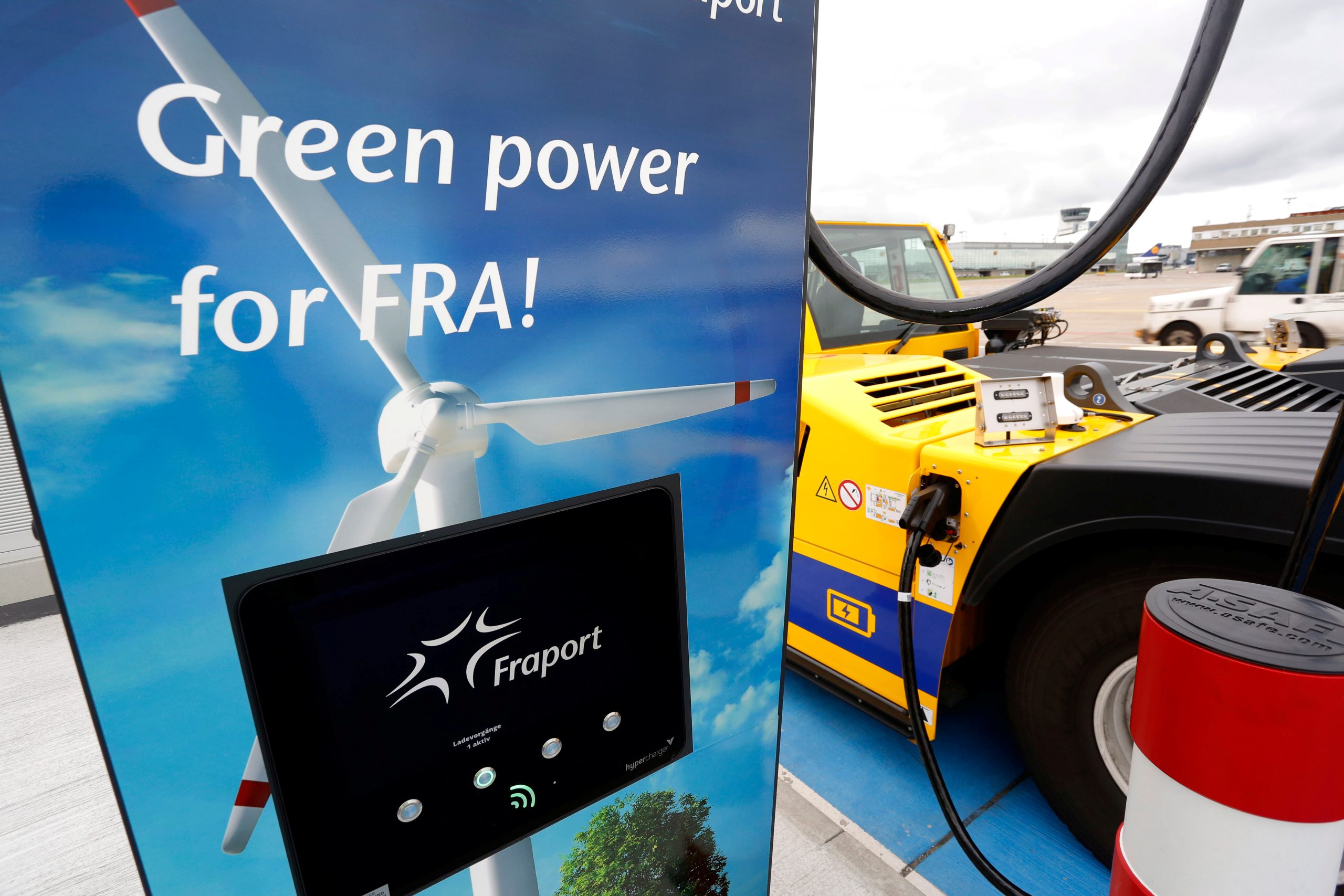 Green Power Schnellladesäule
Green Power Schnellladesäule
Airport operator Fraport is gradually converting the vehicle fleet at Frankfurt Airport to e-drive. At the same time, the charging infrastructure at Germany’s largest aviation hub is growing. This currently works in the familiar way: The electricity flows from the charging point into the vehicle battery. In future, this will also be the case in the opposite direction. Electric vehicles will become mobile storage units that can feed unused energy back into the grid as required. At present, the technology is not yet widely usable and interfaces are not yet standardized. This applies in particular to numerous special vehicles used in aircraft handling.
Fraport is receiving support from the German Federal Ministry of Economics and Climate Protection (BMWK) to transfer this ambitious idea to regular operations at the airport. Over the next four years, a total of over five million euros will flow to Frankfurt Airport from its “Elektro-Mobil” funding program. Fraport itself is investing a further 4.1 million euros in the project together with cooperation partners.
The project’s cooperation partners are Stromnetz Hamburg GmbH, which supports Fraport in the further development of the software, and Darmstadt University of Applied Sciences, which provides scientific support in particular on the economic and technical aspects. The BMWK has transferred responsibility for the project to the German Aerospace Center.
Target: Sustainably stabilize the network and electricity supply
“We will be CO2-free in the Fraport Group by 2045 at the latest. As part of our decarbonization strategy, we are switching to e-mobility and expanding our charging infrastructure. “We will also be relying primarily on wind and solar energy in the coming years,” explains Kuschel. “As a result, in the future there will be too much or too little electricity in our electricity balance circuit at times, depending on generation and consumption. Neither our actual needs on the one hand nor the availability of renewable energies on the other can always be predicted precisely,” he explains. “So we have to develop a system with which we can react flexibly to deviations independently. A key to this is temporary storage.”
Fraport AG’s electric fleet currently includes around 650 vehicles. By 2026, the airport operator will put a further 600 cars, vans, buses and specific handling vehicles with electric drives into service. In total, the batteries in this fleet are intended to use bidirectional charging technology to create a virtual large-scale storage system that can absorb and release a varying amount of electricity at any time. This then needs to be controlled using sophisticated software to meet needs and offers without affecting daily operations at the airport. “In the future, Fraport aims to use bidirectional charging across the board and do justice to the heterogeneous fleet mix at the airport. With regard to the critical infrastructure of an airport, the system must guarantee stable network and supply security at all times. This is initially a demanding challenge, but once successfully implemented it will also prove to be a decisive location advantage,” predicts Kuschel. “From an economic point of view, this also results in interesting aspects: We expect the changeover to optimize electricity procurement in terms of price by making efficient use of existing resources.”
The project duration of a total of four years starts with a twelve-month technological planning phase. In the next three years, almost 90 bi-directional charging points are to be built on the airport site.
Expansion to public infrastructure is conceivable
Bidirectional charging can potentially be expanded to other externally used infrastructure at Frankfurt Airport, such as parking garages. Corresponding transfer concepts and business models for public spaces are components of the project. “Here we see good opportunities, on the one hand, to integrate this innovative technology into the management of energy supply and demand in other ways, as well as to exploit its economic potential,” adds Claus Grunow, Head of Group Strategy and Digitalization at Fraport AG.
Read this and other articles on the topic of electromobility & autonomous driving in the current eMove360° magazine in german language. Download for free or order a print edition in the shop.